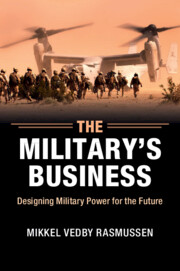1 - Introduction
Published online by Cambridge University Press: 05 March 2015
Summary
I'll tell you this much. War creates a closed world and not only for those in combat but for the plotters, the strategists. Except their war is acronyms, projections, contingencies, methodologies … They become paralyzed by the system of their disposal.
Don DelilloIn January 2012, two helicopters landed discreetly on the outskirts of a Somali coastal village and a Navy SEAL team disembarked the helicopters, making their way to the village. There, Somali ‘pirates’ held an American and a Dane hostage. After a brief firefight, eight of the hostage-takers lay dead and the SEAL team withdrew with the hostages. This operation is a simple example of the decisiveness of military force. There are few other tools at the disposal of a government that produce results that are as immediate and unequivocal as the use of military power. This decisiveness can be deceptive, however. The daring SEAL team rescue neither put an end to Somali lawlessness nor addressed the causes of piracy in the area. And the Navy SEAL team would soon have to go on another mission. Such is the paradox of military power: armed force is the most decisive instrument of a state's power, but the nature of military power is such that the decisiveness is as partial as it is ephemeral. The art of war involves using the right measure of force at the right time for the right ends in acknowledgement of the paradox of military power. Thus, the paradox of military power must be upmost in one's mind when evaluating statements about militaries like the one made by US President Barack Obama in September 2012, when he declared that ‘the United States military is the finest fighting force in the history of the world’. Even if that statement might upset the ghost of a German or Roman general, the US military is incredibly accomplished in combined arms operations, but are such skills the ones most required to ensure the safety of America and the free world? And are the platforms necessary for such operations something the Western taxpayers can continue to pay for? President Obama's statement raises more questions than it answers; and this is the case of Western defence policy in general in the first decades of the twenty-first century.
- Type
- Chapter
- Information
- The Military's BusinessDesigning Military Power for the Future, pp. 1 - 14Publisher: Cambridge University PressPrint publication year: 2015



